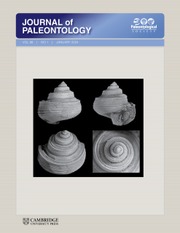Article contents
Biological and environmental rhythms reflected in molluscan shell growth
Published online by Cambridge University Press: 20 December 2017
Abstract
Tidal cycles are reflected in daily growth-increment sequences in shells of many Recent and fossil mollusks. Living specimens of the bivalve Mercenaria mercenaria were notched at the growing edge of the shell and planted intertidally in Barnstable Harbor, Massachusetts. Shells from two lots, killed at intervals of 368 and 723 days after planting, show the same number of small growth increments as there were days from notching to killing. Superimposed on daily growth record are effects of winter (thin daily increments) and tides (14-day cycles of thick and thin daily increments). Comparison of Barnstable tide record with the first year's growth shows that, for each 14-day cycle, thin daily increments form during neap tides and thicker daily increments form during spring tides. Although tidal patterns are present in subtidal Mercenaria shells, they are rarely as pronounced as in intertidal ones. Spawning patterns differ from winter patterns; they are expressed in the shell by an interruption of regular deposition followed by a series of thin daily increments. Continuous sequences of bidaily patterns, one thick daily increment followed by a relatively thin one, are common in M. mercenaria.
The clearest 14-day cycles of deposition were seen in shells of the bivalve Tridacna squamosa. Each daily neap-tide increment is a simple layer consisting of a dark and light zone. Each daily spring-tide increment is a complex layer consisting of two light-dark alternations separated by a depositional break that is more pronounced than the breaks delimiting daily intervals. Preliminary results of growth-increment counts in fossils show a generally decreasing trend of the mean values of days per lunar month toward the Recent. The Pennsylvanian value is 30.07 ± 0.08, a figure that is in general agreement with those of Scrutton (1964), who counted 30.59 days per month on Devonian corals, and Barker (1966), who reported more than 30 days per month in Pennsylvanian bivalves.
- Type
- Research Article
- Information
- Journal of Paleontology , Volume 42 , Issue S2: Paleontological Society Memoir 2. Paleobiological Aspects of Growth and Development: A Symposium , September 1968 , pp. 64 - 80
- Copyright
- Copyright © 1968 Paleontological Society
References
- 153
- Cited by


